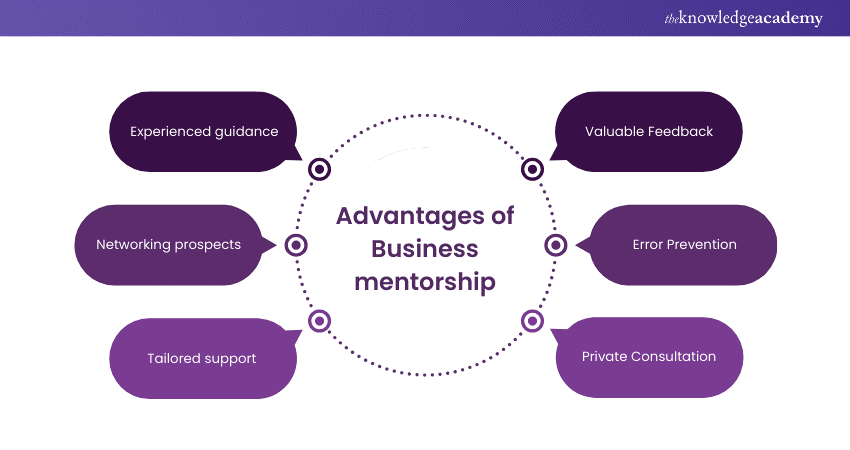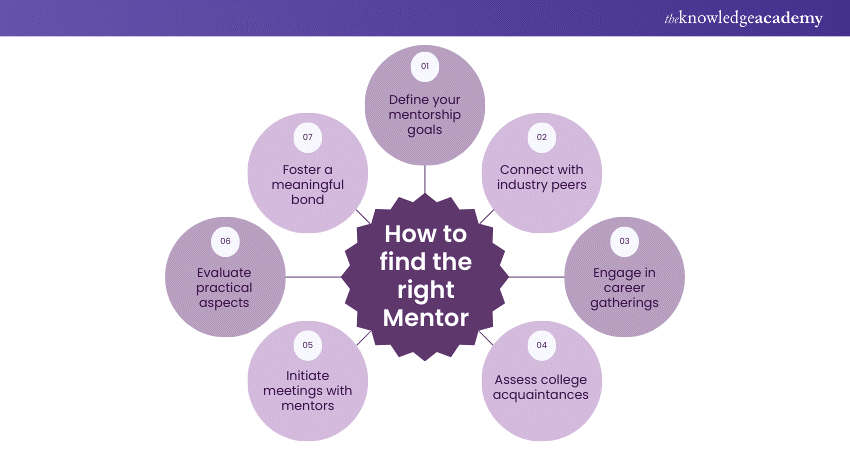We may not have the course you’re looking for. If you enquire or give us a call on +918037244591 and speak to our training experts, we may still be able to help with your training requirements.
Training Outcomes Within Your Budget!
We ensure quality, budget-alignment, and timely delivery by our expert instructors.

When it comes to understanding the complex world of business, having a trusted guide can make all the difference. A Business Mentor, sometimes responsibly likened to a veteran Sherpa who condition climbers up a strenuous mountain range, is essential in an entrepreneurial journey. So, who is a Business Mentor? Understanding the different types of mentoring can clarify the diverse roles and approaches that Business Mentors may employ to support entrepreneurs.
Consider them as experienced trailblazer that reveals their knowledge in every activity, helps starts up businesses under the mentor role to provide help and guide the entrepreneurs.
Table of Contents
1) Who is a Business Mentor?
2) Advantages of Business Mentorship
a) Experienced guidance
b) Networking prospects
c) Tailored support
3) How to find the right Mentor
a) Define your mentorship goals
b) Connect with industry peers
c) Engage in career gatherings
4) Conclusion
Who is a Business Mentor?
A Business Mentor is an accomplished businessman or business lady who is quick to give wise advice, support, and business ways to individuals seeking to improve their business skills and, eventually, succeed. They offer valuable insights, share their knowledge and experiences, and provide practical advice to help mentees solve challenges, make informed decisions, and develop their business acumen. An entrepreneurship moulder can act in the role of a mentor, serving as a trusting counsellor, providing mentees with encouragement, constructive remarks, and discipline, thus contributing to the achievement of their business targets and unlocking their full potential.
Advantages of Business Mentorship

Let's learn about the real advantages of Business Mentorship, where each step reveals a layer of support, insight, and opportunity that could transform your entrepreneurial voyage.
1) Experienced Guidance
Embarking on a business venture can seem very daunting for someone with no prior experience. Having a guide who knows the right way and the hazards that potentially lies on the line can be relieving. Business Mentors have trod such trails, dealt with the kind of problems you're dealing with, overcome hurdles and learnt from them.
Their guidance comes from real-world successes and failures, providing you with practical advice that textbooks or online courses can't offer. In such a way, your business is not only an adventure of your Creative Thinking without a guide but also a friendly mentorship, making you able to make informed decisions thanks to years of practical experience.
2) Networking Prospects
Mentors can introduce mentees to their professional networks, expanding their connections and opening doors to new opportunities and partnerships. Business Mentors who are veterans with broad experience so many professional contacts that one can easily communicate with, such as the teammates of the company, investors, and customers. This network, built over the years, can welcome new opportunities that might otherwise remain closed to a budding entrepreneur.
Through their mentor, an entrepreneur gains access to a broader community of like-minded individuals, offering opportunities for collaboration, insight, and expansion.
3) Tailored Support
Having a Business Mentor means it is a guide to the mentee and provides a personalised, tailored advisory. Mentors take the time to understand the mentee's specific goals, challenges, and areas of improvement. They can accordingly offer individualised aids and assistance to mentees, taking into account their peculiar specifics. This tailored approach allows mentees to receive relevant advice, strategies, and resources that align with their specific business objectives. The mentorship role, on the other side, functions as a sounding board, which provides the mentees with their own tailor-made solutions and deepens understanding based on their own unique situation.
4) Valuable feedback
Feedback, as in personal and professional development, is a vital component. A Business Mentor provides mentees with valuable feedback on their ideas, strategies, and performance. They offer their points of view that are carefully examined and critiqued constructively, guiding the entrepreneurs towards a path of improving their proposal, marketing strategy, or business methods. Mentors can identify strengths to leverage and weaknesses to address, ultimately helping mentees improve their skills and Decision-Making abilities. The mentor’s input plays an essential role in catalysing the continuous growth of mentees, which also spurs them to put much effort into achieving their goals.
5) Error prevention
One of the significant advantages of having a Business Mentor is the ability to prevent costly errors. Mentors are able to offer their own stories and know-how, and this way, mentees steer clear of making wrong steps. By leveraging the mentor's expertise, mentees can navigate potential pitfalls more effectively, mitigating risks and minimising setbacks. A mentor will assist their protégé with Risk Management and provide industry insights, too. With the combination of these, the mentees will make informed business choices that will propel them to their long-term goals. This proactive approach to error prevention can save mentees valuable time, resources, and money.
6) Private consultation
Doing business of such a nature where the right place falls out of reach, it is difficult to find a private zone to raise questions, try ideas, or verify if one has handled risks properly. Mentors are your very personal sanctuary where you would be free to be vulnerable, seek advice, or just be commanded to offload the difficulties of decision-making. This counselling session is like a sanctuary where you can open up modalities of communication and explore your options for release in a nonjudgmental atmosphere. It represents a person who is a reliable adviser or friend, someone participating in your success, offering you a secure and confidential setting to manage the hurdles that an entrepreneur often faces in running their business.
Learn all about Mentoring and coaching with our Coaching and Mentoring Course – join today!
How to find the right Mentor?

To get a coach, which is similar to navigating the seas with a lighthouse directional guide, is an essential part of your entrepreneurial journey. It is akin to reaching out to someone who will be a tour guide who can guide you out of the treacherous route so as to reach a spot you have always wanted to be at. Here’s how you can embark on this quest:
1) Define Your Mentorship Goals
Start with introspection. Ask yourself what you hope to achieve through mentorship. Is it about gaining insights into your industry, developing specific skills, or navigating career transitions? Identifying your objectives is like setting the coordinates for your journey; it ensures that you seek out a mentor who can genuinely help you chart the course.
2) Connect With Industry Peers
Your network is paramount for building potential mentor relationships. Engage with your industry peers, whether through social media platforms, professional networking events, or industry forums. These interactions can lead you to experienced people who share your professional interests and values and who might be open to a mentorship role.
3) Engage in Career Gatherings
Being a student, you can participate in conferences, seminars, and workshops related to your field. Attending such kind of confabulation is not simply a matter of learning. Instead, It is the interaction process with mentors who are leaders and influential people in your industry. It merely means to embrace zones of interactions that may likely create mentoring relationships.
4) Assess College Acquaintances
Don’t overlook the connections you’ve made in college, including professors and alumni. These individuals often possess a wealth of knowledge and may offer mentorship or connect you with potential mentors. They can provide a unique perspective, having observed your growth and understanding your academic foundation.
5) Initiate Meetings With Mentors
Once you’ve figured out your potential mentors, contact them. Be clear about why you’re interested in their mentorship and what you hope to achieve. It is similar to inviting someone on a journey with you. You need to articulate why the journey is worth their time and what you envision their role to be.
6) Evaluate Practical Aspects
Consider the practicalities of the mentorship. Can your potential mentor realistically dedicate time to your development? Is there a logistical match in terms of location or availability for meetings? These considerations are crucial to ensuring that the mentorship relationship is viable and mutually beneficial.
7) Foster a Meaningful Bond
A real mentorship is an affectionate relationship. What is most important in this respect is the relationship-establishing process, which should be consistent with reciprocal respect, trust, and endlessness. It doesn't stop at being solely a professional development; it requires the cultivation of a connection between the mentor and the mentee as it makes life better for both of them. Developing openness and receptiveness to feedback, expressing appreciation for an instructor's assistance and participation, and forming strong commitment are noteworthy (key) elements in developing a close mentor-mentee relationship.
Discover the difference between coaching and mentoring to choose the best path for your development.
Conclusion
In matters of entrepreneurship, the Business Mentor who plays the role of a driving force on the path to growth is vital to the entrepreneur who devotes the mentor's time and attention to addressing the challenges and goals which are specific to the fixture.
Master effective leadership and management skills with our Successful People Management and Team Leadership course – join now!
Frequently Asked Questions

The biggest challenge in mentoring often lies in establishing a meaningful connection and mutual understanding between the mentor and mentee. This includes aligning expectations, communication styles, and commitment levels to ensure a fruitful and effective mentoring relationship.

Mentoring goes wrong when there is a mismatch in expectations, lack of commitment, poor communication, or absence of respect and trust between the mentor and mentee. These issues can lead to misunderstandings, frustration, and a failure to achieve the desired outcomes of the mentoring relationship.

The Knowledge Academy takes global learning to new heights, offering over 30,000 online courses across 490+ locations in 220 countries. This expansive reach ensures accessibility and convenience for learners worldwide.
Alongside our diverse Online Course Catalogue, encompassing 17 major categories, we go the extra mile by providing a plethora of free educational Online Resources like News updates, Blogs, videos, webinars, and interview questions. Tailoring learning experiences further, professionals can maximise value with customisable Course Bundles of TKA.

The Knowledge Academy’s Knowledge Pass, a prepaid voucher, adds another layer of flexibility, allowing course bookings over a 12-month period. Join us on a journey where education knows no bounds.

The Knowledge Academy offers various Business skills courses, including Communication Skills courses, Leadership courses, Management courses, and Personal Development courses. These courses cater to different skill levels, providing comprehensive insights into How to Develop Leadership Competencies.
Our Business Skills blogs cover a range of topics related to leadership approach, offering valuable resources, best practices, and industry insights. Whether you are a beginner or looking to advance your leadership skills, The Knowledge Academy's diverse courses and informative blogs have you covered.
Upcoming Business Skills Resources Batches & Dates
Date
 Mentoring Training Course
Mentoring Training Course
Fri 24th Jan 2025
Fri 28th Mar 2025
Fri 23rd May 2025
Fri 25th Jul 2025
Fri 26th Sep 2025
Fri 28th Nov 2025







 Top Rated Course
Top Rated Course



 If you wish to make any changes to your course, please
If you wish to make any changes to your course, please


